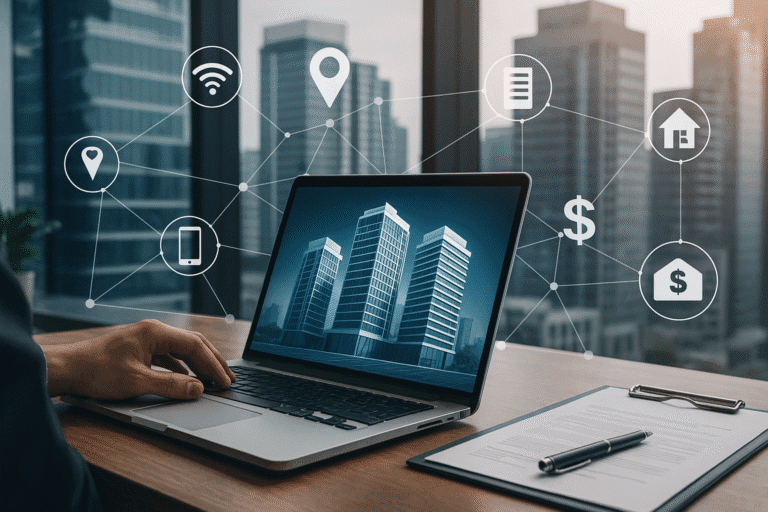Introduction: The Rise of PropTech in Commercial Real Estate
The commercial real estate sector is undergoing a significant transformation, with Property Technology (PropTech) driving much of the change. April 2024 marks a key moment in this shift as PropTech innovations continue to reshape the way landlords and tenants engage with the leasing process. From artificial intelligence (AI) and virtual leasing platforms to smart building technologies and sustainability-focused solutions, the adoption of these tools has improved operational efficiency and transformed tenant experiences. These advancements are not just streamlining processes but also reshaping the future of real estate.
AI-Driven Property Management: A Game Changer for Landlords
Artificial intelligence has emerged as a dominant force in property management. AI-driven systems are being used to predict maintenance issues, optimize energy consumption, and automate day-to-day operations, which reduces the burden on property managers. These systems can also provide valuable insights into tenant behavior, enabling landlords to anticipate needs and proactively address potential problems. With AI’s ability to analyze vast amounts of data, landlords can make informed decisions that improve both the financial performance of their properties and tenant satisfaction.
One notable example is the use of AI in rent pricing. PropTech platforms are now able to leverage machine learning algorithms to adjust rent prices in real time based on market conditions, demand, and comparable property data. This dynamic pricing strategy ensures that property owners can maximize their revenue while offering competitive rental rates, benefiting both parties.
Virtual Leasing Platforms: Streamlining the Leasing Experience
Gone are the days of lengthy in-person meetings and paper-heavy leasing processes. Virtual leasing platforms have revolutionized how tenants and landlords interact, enabling a completely digital leasing experience. Prospective tenants can now view properties, take virtual tours, and sign leases without ever stepping foot on the property. These platforms offer a more efficient and convenient way for tenants to find their next space, while landlords benefit from an expanded pool of potential tenants, reducing vacancy rates.
Virtual leasing platforms also allow for better communication between landlords and tenants. Features such as instant messaging, document sharing, and electronic signatures enable faster response times and smoother transaction processes. In addition, these platforms can be integrated with other PropTech tools, such as AI-powered property management systems, to further enhance the leasing experience.
Smart Building Technologies: Enhancing Efficiency and Sustainability
As sustainability becomes a central focus in the commercial real estate industry, smart building technologies are playing a critical role in driving energy efficiency and reducing environmental impact. PropTech solutions like IoT (Internet of Things)-enabled devices are being integrated into buildings to monitor and control energy usage in real-time, resulting in reduced operating costs and enhanced sustainability.
Smart thermostats, automated lighting systems, and energy-efficient HVAC systems are some of the most common innovations being deployed in commercial properties. These technologies adjust building conditions based on real-time occupancy data, helping to reduce unnecessary energy consumption. By adopting these smart solutions, landlords can meet increasingly stringent environmental regulations while offering tenants a more comfortable and sustainable living or working environment.
Sustainability: The Leading Trend in PropTech Investment
One of the most notable trends in 2024 is the growing emphasis on sustainability within PropTech. According to JLL Spark, sustainable building upgrades have become a focal point for investors, with sustainability-focused PropTech solutions receiving the lion’s share of venture capital funding this year. These solutions help buildings reduce their carbon footprint, manage waste more efficiently, and improve energy efficiency, all of which are critical in the push toward net-zero emissions.
The shift towards greener buildings is not just driven by environmental concerns but also by the growing demand from tenants and investors for more sustainable properties. Companies are increasingly looking to reduce their environmental impact, and tenants are seeking buildings that align with their sustainability goals. As such, landlords are investing in PropTech solutions that will not only reduce operating costs but also enhance their properties’ appeal to a broader market.
Improved Tenant Experience: The Key to Stronger Landlord-Tenant Relationships
PropTech is not only transforming the way commercial properties are managed, but it is also improving the tenant experience. By leveraging technology, landlords can offer personalized services, such as customized climate control, advanced security features, and seamless communication platforms. This focus on tenant satisfaction is leading to stronger landlord-tenant relationships, with tenants feeling more valued and empowered.
Moreover, PropTech platforms allow tenants to easily access building amenities, submit maintenance requests, and communicate directly with property managers. This increased level of transparency and responsiveness fosters trust and collaboration between both parties, making it easier for tenants to address issues and for landlords to maintain their properties efficiently.
Conclusion: The Future of Commercial Leasing
As we move further into 2024, the commercial leasing landscape is increasingly being shaped by PropTech. Innovations in AI, virtual leasing, smart building technologies, and sustainability-focused solutions are improving operational efficiencies and transforming tenant experiences. These advancements not only enhance the financial performance of properties but also create a more sustainable and user-friendly environment for tenants.
Looking ahead, PropTech will continue to drive change in the commercial real estate sector, paving the way for more efficient, transparent, and sustainable leasing practices. As these technologies evolve, they will further enhance the relationships between landlords and tenants, creating a new standard for the future of commercial leasing.
